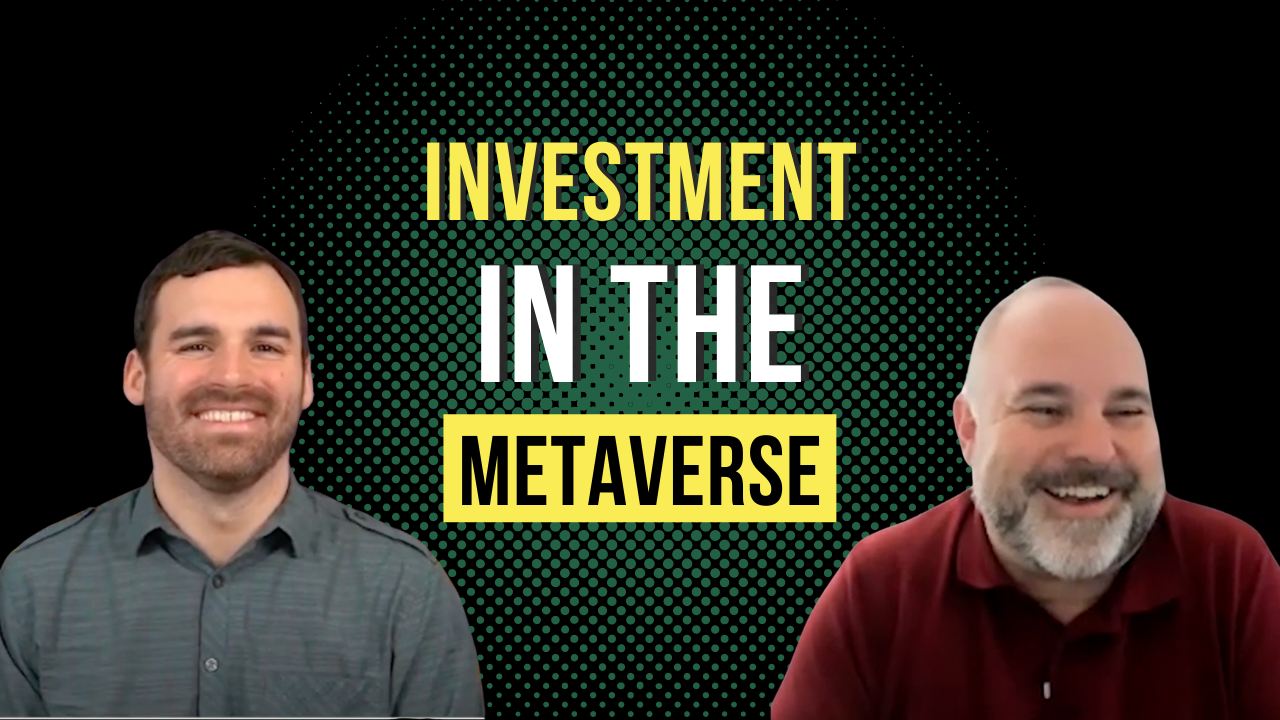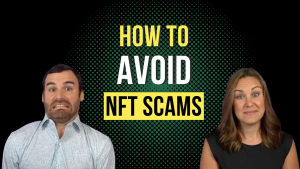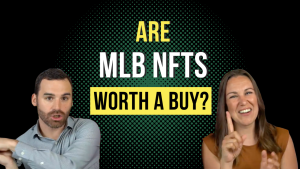Cryptogic provides tools, information, and commentary focused especially on cryptocurrencies, financial and cryptocurrency markets, economic trends, and trading strategies; these tools, information, and commentary are provided for general information purposes only. Neither Cryptogic nor any of its owners or employees are financial planners, investment advisors, or broker-dealers in any jurisdiction. Cryptogic does not provide investment advice, investment services, legal advice, legal services, tax advice, or tax services. Cryptogic does not contain, or constitute, and should not be interpreted as legal advice or opinion. Cryptogic is not a substitute for professional investment advice, tax preparation or legal advice. Consult an investment, tax or legal professional for specific advice about your situation. Click here to read our Website Terms of Use.
Investment In The Metaverse, With Dan Wallace-Brewster

The Metaverse is still developing, making it hard for many investors to evaluate its potential. Still, mainstream adoption and appeal of NFTs and other digital products (notably in gaming) is on the rise.
Dan Wallace-Brewster, the SVP of Marketing at Scalefast, an international eCommerce solution, joins the show to offer insights on where it’s all headed. While there’s still an abundance of consumer skepticism, investors would do well to take note of brands actively working to capitalize on all the Metaverse will offer.
Watch On YouTube
Episode Highlights
2022 DTC Hype Report Revealing the Metaverse: “Confusion and lack of education amongst top hold-ups for consumers who have yet to purchase virtual goods or NFTS. More than three-quarters of American consumers have never purchased according to Scalefast’s new “Revealing the Metaverse Report” highlighting consumer sentiment towards purchasing NFTs and virtual goods.” (Scalefast)
What Is the Metaverse, Exactly?: “To a certain extent, talking about what “the metaverse” means is a bit like having a discussion about what “the internet” means in the 1970s. The building blocks of a new form of communication were in the process of being built, but no one could really know what the reality would look like.” (Wired)
Today’s Guest: Dan Wallace-Brewster
About The Show
Cryptogic is the show for crypto investors who are focused on long term results. Follow Scott and Andy as they explore the investable world of blockchain technology, NFTs, Bitcoin, Ethereum, and other cryptocurrencies.
Connect With Cryptogic
- Watch Cryptogic on YouTube
- Listen to Cryptogic on Apple Podcasts
- Listen to Cryptogic on Google Podcasts
- Listen to Cryptogic on Spotify
- Follow Cryptogic on Twitter
Transcript
Scott: Hello, and welcome to another episode of Cryptogic. Scott with you. And happy to be bringing another great one on tap where today we’re going to be talking about the Metaverse, we’re going to be talking about NFTs. And joining me to offer some insights on this is Dan Wallace-Brewster who is the SVP of marketing at Scalefast.
And he’s got a lot of insights, so I want to dive right in. Dan, welcome to the show.
Dan: Thanks, Scott. It’s great to be here.
Scott: Well, thank you for being here. As I said, today we want to talk about the Metaverse, we want to talk about NFTs, all this buzz about them, and really how the wider market is viewing them, which I think for investors is such a crucial, I guess, thing to have your finger on that pulse. So, to kick things off, though, can you set the stage?
What’s the state of the Metaverse today? I find even folks who hold NFTs still struggle to define what the Metaverse even is. So, what’s your perspective there?
Dan: Yeah. I mean, the Metaverse is hardly young, but it’s not either. It’s certainly got a ways to go as the rules are being defined, but it’s really been around for a while and it’s been the creators of just people who really like to take advantage of the ability to build worlds and existences that don’t follow the same rules as may exist in the physical world.
So, for that reason, it’s always been thought to kind of be an outlier or a typical phase to gamers so far. And then Mark Zuckerberg decided to make it part of the general market zeitgeist when he rebranded Facebook, Meta.
So, people started asking the question, not only, “What is the Metaverse?” but, “What could the Metaverse be going forward?” And realistically, it can be anything. We don’t really know yet. But a lot of those questions are being asked and answered by entrepreneurs and established brands alike. So, what Facebook has done is it’s created the critical mass of consumers needed for any concept to really take off and create value, especially for brands because without customers, there’s no real value for a product or a brand to invest in a market like this.
And so now we’re at that tipping point where the market is big enough for traditional brands to say, “Hey, what’s this all about?” and start putting dollars into the products.
Scott: Right, and really trying to, I guess, leverage it and grow their brands and, you know, potentially for investors in those brands have some returns-driven. Before we go further, because there’s just so much to dive into there, can you tell us a bit about the story behind Scalefast and really what you all do?
Dan: Yeah. Scalefast really started as an e-commerce platform for gaming publishers to deliver both physical and digital product in the same transaction. If you think about anything you buy on the internet, it’s almost like a spaghetti bowl of different third parties and payment providers and fulfillment and transit and certainly a lot of data being passed back and forth very quickly to make that transaction possible.
When you add both physical and digital products into the same cart, it multiplies that complexity almost exponentially. So, Scalefast is one of the first developers to find a solution to really crack that and deliver that seamless consumer experience especially during a product drop for a game, for example, like Final Fantasy, it’s got a new release.
There are millions of people who want that experience, that download code immediately. And when they send that money, they expect it to be delivered immediately. And that could crash a lot of unsuspecting servers. So, Scalefast solved not only the scalability for the infrastructure, but also managing the consumer experience and making it a brand-positive experience.
So, not only did your site not crash, but the transaction was pleasurable, you got what you wanted in the end, and you probably downloaded or bought some additional items that made sense or were part of your fandom for that particular product. So, we really started to cater towards brands that had super fans.
And the next best thing out of gaming was the luxury space. So, we’ve found a lot of success working with luxury brands who want to pair digital experiences and product with their physical product.
Scott: I love that. And as a gamer myself, you know, when you are buying a digital product for your character or whatever it may be, you do want that instantly. And that’s just so critical and especially today as we’re talking about the Metaverse and we’re going to be touching on NFTs.
Everything, there’s just more digital, more of that experience. And if you have hiccups, things can go wrong quite quickly. And that can be bad for brands, that can be bad for businesses. So, I think that you guys clearly have really hit a good vein there. I want to move forward with the discussion on NFTs because I know that Scalefast recently did some consumer research into NFTs and the Metaverse.
And can you kind of, I guess, share and tease out what that research entailed?
Dan: Yeah, I mean, one of the things that we really strive to do is provide a blueprint for the e-commerce world for our clients to be successful. And since NFTs and blockchain and the Metaverse have become part of our zeitgeist, we wanted to understand and provide the consumer’s perspective of what these products could mean for our clients.
So, we asked a bunch of customers or consumers, really just a general audience of consumers what they thought of the Metaverse and NFTs. And not surprisingly, there wasn’t a lot of knowledge about them. But what was surprising was how little interest there was in learning about it by a significant portion of the population.
So, that showed that there was… We’re pretty far from a general market adoption of NFTs and brands who want to invest in it have some steps to take. So, we figured out first is you have to educate your market. You’re going to have to explain exactly what NFTs are in the perspective or in the context of what you’re delivering in the real world.
You’re going to have the advantage of trust because one of the things our research found was that consumers really want to trust the purveyor of NFTs if they’re going to get into the space. So, established brands naturally have an advantage there. They want to know that it’s an investment.
Investing in something that’s intangible, you can’t touch and feel, has a long way to go to prove that it’s going to provide value in the long term. And, you know, even a baseball card, you can still appreciate it, you can put it on the mantel.
Even if it doesn’t actually have value in the grand marketplace, if it’s of your favorite player or represents a memory you have as a kid, it has value to you. That’s very hard to do in the NFT space. So, people want to understand that it’s going to pay off as an investment. And then it should, when possible, be attached to something tangible in the real world.
I think one really exciting evolution of the NFT market will be associated with sporting and entertainment events because those events used to have ticket stubs, ticket stubs that represented a memory that was unique to you literally from your seat in a venue on that particular night that is solely identified to you.
And when ticket stubs went away, that went away. And NFTs could replace that and with the appropriate storage allow you to relive that experience in perpetuity. And if you witness something that’s historic, then it could even have value on a secondary market.
And not only could you benefit from that investment and that event and being lucky enough to be there at that time, but so could the property so could the players who are on the court at that time. I think a great example is how many people are going to say they were there when Mike Krzyzewski, you know, coached his last game for Duke, right?
Scott: Right.
Dan: It’s finally right now. And you’re going to have proof that you were there in that seat and that venue at that time and it’s going to be able to be proven to be authentic and ideally very scarce.
Scott: A hundred percent. And you’ve touched on so many, I think, really important things that I think brands are trying to solve, the technology is trying to solve, and then the value that can be with an NFT as you were talking about the sort of real-world benefits kind of tied to the digital benefits.
On our sister podcast, just this week, we had an episode where we talked all about a NFT called the MetaZoo, which is a trading card game, and they have an NFT. And there’s real-world benefits to it because you get exclusive access to, you know, new trading cards that they’re releasing, new box sets, etc., etc.
So, I think the kind of marrying of those two really does create that value that people are looking for. And you said another thing that really struck me was you were talking about just the general, I guess, maybe a bit of skepticism or of really wanting to trust. And yes, established brands can have that sort of built-in trust, so that’s a huge win.
But in this kind of wild-west space still, there’s concerns about rug polls, you know, for cryptocurrencies, for NFTs, all of this, you know, fraudsters fly by night. And so consumers want to be, you know, really assured, reassured, rather. So, kind of speaking to that when you look at mainstream adoption for crypto or NFTs, do you think that this skepticism is decreasing?
Is it increasing? And really, will it change?
Dan: Well, it has to change. I don’t think that the Metaverse is going to go away. I think that the potential both in user experience, the value provided to consumers, and the transactional revenue to brands and business is just too great. And so I think the horse has left the barn on that.
Now, how fast it becomes trustworthy is obviously of great importance to publishers, consumers, and brands alike. And I think early adopters from the corporate side are rightfully taking a beat and saying, “Okay, before we are completely out there, let’s make sure that we’ve solved some of these problems to protect our own IP.”
I mean, you’re seeing trademark filings every single day for brands in the physical world to make sure that they’re protected in a digital world. Like Burger King has filed trademark protections in the Metaverse for the whopper and all of their brands and sandwiches.
And I’m sure McDonald’s and Wendy’s are all doing the same thing. And the reason why is because there is an understanding that at some point in the near future the physical world will be almost mirrored in the digital world. So, any brand or IP protection you have in the physical world needs to be mirrored there as well. But the challenge is without the physical limitations of the ingredients that go into a whopper, for example, you could put anything in a digital whopper or a digital sandwich.
There’s an infinite number of thoughts and products that would need to be protected and first conceived in a digital space. So, I think the wild-wild-west is going to be the law of the land for the foreseeable future, but there are going to have to be ground rules set and there’s going to have to be framework and some respect, specially for intellectual property by multiple platforms, universe.
And the way to do that is really NFTs. NFTs will become the centralized, I guess, recognition of ownership of authenticity and the history that multiple platforms can use to make things portable. And portability is going to be really the next big thing, I think, that whoever really solves that and gets the critical mass of users that know that products that they buy in the digital world can be used across multiple games, platform worlds, they’re going to be the ones who are the recognized leader in the Metaverse, so to speak, and can start to write their own ground rules about how brands and consumers transact.
Scott: Do you think that when you’re looking at brands that are… Like, for example, you know, Meta, Facebook.. do you think that they will kind of have this push and pull of, “Well, we want people to stay in our Metaverse. We want to keep them, you know, in the walls we’ve set up,” do you think there’ll be a push and pull of the value there of we’re doing that versus we’re allowing free movement between worlds, between games?
I’m just kind of curious to hear your perspective on that.
Dan: I think that Meta would do that at their own peril. I think that it behooves anyone in the Metaverse to create portability. And if you bring the most number of customers into the Metaverse and you own the most number of transactions by quality of your experience, earning trust, making sure your servers are always performing, top of your developing hardware, experiential hardware, and haptic designs that are making the experience better, then customers will gravitate towards your version of the Metaverse.
But to have that walled garden is going to be a mistake, I think. I think the whole beauty of the Metaverse is portability and decentralization. And it would violate the entire culture of it to try to prevent that from happening. And I think if that’s the initial path, then it’s going to be a bad one, but for whoever chooses that path.
Scott: Right, right. When you look at businesses, be they retail, currently e-commerce, I guess, how will they maybe intersect with the Metaverse and what you’re seeing right now beyond just what we’re talking about with Meta and maybe, you know, registering trademarks? Do you see activity with, you know, creating as much value as they can, creating their own NFTs?
I’m curious what you’re seeing from the brands, what the actual, I guess, functional rubber meets the road actions you’re seeing.
Dan: Right, I mean, I think that, you know, our initial feedback to clients is that you want to augment the core business you’ve already succeeded in. Don’t try to replace it. And a really good example of that is there’s a developer who has created augmented reality sneakers. And augmented reality sneakers are a digital representation over a physical item, right?
They’re… Using your mobile phone to capture a video, but the sneakers that you’re wearing have some kind of unique attribute through augmented reality. That’s a good example of where, you know, a pair of Nikes, for example, could have digital attributes when viewed through a filter on Snapchat.
And when you’re wearing them, they have flames or some other crazy thing that kids would love and happily pay for. So, they get to have their Snapchat video. Well, that same thing could be with clothes, with jewelry, and with any kind of identifying item that you use in a game or an avatar. And for that reason, there are going to be overlays or crossovers between the physical and digital world that I think will bridge the gap to the point where, for whatever reason maybe because gas is $60 a gallon and that we never leave our house and most of our experience is done virtually.
The only difference between that space and what we’re doing today is it’s two-dimensional. We’re not wearing funny bug-like goggles. But at some point in the future, we may be having this conversation in a virtual room sitting in chairs with, you know, three-dimensionally perceived images of ourselves.
And that may be more normal than not.
Scott: Right, and as you were saying, I think that’s such a great example, especially focusing in on the Nike aspect of it because you have this… There’s the collectible aspect. We all know the secondary market for, you know, new Nike releases. So, if you had sort of that digital overlay and it was exclusive for whatever reason or rare, then you can see a tremendous amount of value that investors, be they invested in cryptocurrencies or NFTs currently or really the underlying technologies themselves through the companies that are developing them.
That’s really compelling, right?
Dan: Yeah, exactly. And I think that the expansion of the Metaverse is also a great democratization of creative talent. The barrier to entry to be a fashion designer or a shoe designer or an artist or a musician or a filmmaker, anything that is going to be lowered to the point that…
And we’ve seen it, we’ve seen it in the early NFT market that 12-year-olds are becoming millionaires because they had a unique set of skills that allowed them to recreate a piece of art 10,000 different ways. They had a big brother who had figured out how they could mix NFTs associated with those pieces of art. And then they had a secondary market.
And that transactional volume created value and wealth for somebody who would never have had that opportunity prior to this, I guess, phenomenon.
Scott: Right, right. We’ve talked about Facebook/Meta a number of times already, and they’ve obviously… they’ve gotten heavily into the Metaverse. Are there many other huge brands making inroads? And do you get a sense that the early movers, I guess, are going to have potentially the most success with consumers and maybe really be positioned as the wild-west sorts itself out?
Dan: I think there’s no question that established brands will have an advantage because they have that trust that they’ve paid billions and millions of dollars to earn with consumers. But at some point, there will be, just like there were digital native vertical brands like Warby Parker or other ones who started their entire business online.
There will be businesses and brands that build themselves completely within the Metaverse construct and have no physical complement at first. And they won’t have that advantage of trust, but that hard work will have been done by these early adopters. So, yes, there’s no question that early movers among established brands particularly with, you know, very widely recognized logos are going to be at an advantage at first.
But I think inevitably, there’s just going to be too much great content that is going to be created outside of the traditional brands that I think that there’ll be new products, new services, and new personalities that evolve on their own and don’t have that off Metaverse existence that the others do.
Scott: Absolutely. As you look across the companies, the brands that are, you know, making inroads into digital and going further into the Metaverse, I guess, are there signs that you could maybe point to when you look at a company that I guess speak to them really having the right approach to sort of chasing that growth in the digital, some things that you see the companies doing right that are… that’s a signal that they’re on the right path.
Dan: Yeah, I think that they have to be very careful not to alienate their traditional consumer. And luxury brands are the best example of that, right? I mean, they… as you would expect, they cater to an older audience who you would not normally associate with early adoption of NFTs.
Scott: Right.
Dan: They’ve got multigenerational accumulated wealth in investments. They’re, I think, putting money into the development of the Metaverse not only to protect their brand in this new world, but also to identify ways to reach a new younger marketplace.
And I think that they can successfully tow that line, catering to their existing market while attracting a new market. And at some point unifying what they deliver in both physical and digital product in the same transaction will serve both and, you know, catch them up with all the younger perceived brands that are out there and create enormous shareholder revenue and value for those brands.
So, if they don’t mess up, I think that all of the early adopters are going to be extremely… receive extremely high growth, I think, as the Metaverse evolves.
Scott: Absolutely, and what I might say from the investor perspective is to pay attention to that, see what steps whatever brand is taking, and how thoughtful they are with, okay, does this fit with maybe their existing physical products or services?
Are they being thoughtful to not alienate? As you were mentioning. And how does that feel? Because I think that there have been releases or examples where, you know, a brand has said, “Yep, we’re doing this, we’re going digital here, we’re on the blockchain,” and then it’s like, “Well, how does that fit? What are you even doing?”
And so I think kind of companies that are striking that balance it seems, to me, you can identify those often, right?
Dan: Exactly, and they also need to be patient. I mean, this is not a sprint. This isn’t a marathon. Like I said, I don’t think the Metaverse is going away. It’s going to be a permanent part of our economy. And the brands that are patient and make sure that their IP is protected, that all the T’s are crossed and the I’s are dotted, and that they are very intentional and deliberate with how they introduce products, those are going to be the success stories.
And then, you know, there are going to be incidents because it is such an undefined space of fraud and IP fraud and other things there where customers were not best served. And they’re going to lose that trust. And without the trust, they could be forever cut off from this new economy.
Scott: Right, and so that’s why these sorts of careful march is so critical. And that’s why I’m probably sounding like a broken record to our listeners, but that’s why when people ask me, I’m saying, “I’m long, I’m long on crypto. I’m long on NFTs and the Metaverse and the underlying blockchain technologies. I’m long on this.”
And even if it isn’t, you know, a hit right now or you can’t even exactly see the exact path, I’m still long on it because I think that this process is this slow march, but steady forward, right?
Dan: Exactly, right. And I think that the next, I guess, rapid acceleration is going to be the next evolution of hardware, an experiential hardware. The Oculus generation is going to become more accessible to more people. Households aren’t going to just have one, they’re going to have to have three or four.
Household members are going to be interacting with multiple units in their virtual worlds. And that’s going to be accompanied with faster internet, better computers, more accessibility overall. These are all things that take time to develop and
[inaudible] in urban and rural areas alike. And once that infrastructure, that groundwork is laid, then that marketplace is going to be almost infinite.
Scott: Absolutely. Thank you so much for joining me on the show today, offering such great insight on the Metaverse, NFTs, this sort of new world we’re in that’s continuing to be built and it’s going to be exciting to see where it all goes. And if our listeners want to find out a bit more about Scalefast specifically, where can they do that?
Where should they go?
Dan: Yeah, you can find out all about Scalefast at scalefast.com. We’re also on all the social channels. And we’re excited to see how this evolves. And we plan to be a big part of it.
Scott: Fantastic. Thanks again, Dan.
Dan: Thank you, Scott.



